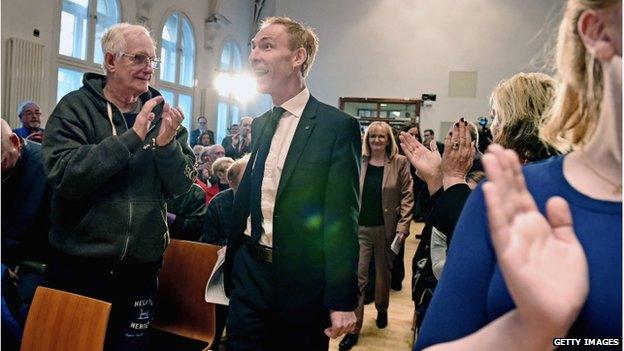Shaking off the habit of losing
- Published

Those who were there liked it. Rather a lot, it would seem, although audience reaction is not an entirely reliable guide in these shallow days.
Presumably those who harbour doubts about Jim Murphy's leadership of Scottish Labour stayed away. Certainly, there was no sign of Johann Lamont - and no mention of her either.
Incoming leaders generally make a token reference to their predecessor: a resolute pretence that they intend to build upon the relatively sound foundations left by the departed, even if one of those foundations is a legacy of consistent defeat.
Not on this occasion. Mr Murphy's talk was of a fresh start, of new beginnings, of the rebirth indeed of Scottish Labour. Matters, it would appear, are too grave for the customary proprieties. Labour, Mr Murphy has concluded, needs to be shaken from its complacency, liberated from the habit of losing.
This was a skilled performance by Mr Murphy in Glasgow today, setting out a new initiative for the party in Scotland. He announced that he intended to redraft Clause Four of the party's constitution, for Scotland alone, in order to stress the autonomy of Scottish Labour.
'Branch office'
Is this symbolic? Yes, of course, just as it was twenty years ago when Tony Blair confronted his own party by announcing that Clause Four would be redrawn to reflect modern party policy on the economy.
But, for Mr Murphy, there is substance here too. He may not have mentioned Johann Lamont but he is responding directly and precisely to her accusation that Scottish Labour had been treated as a branch office by Ed Miliband and the party in London.
He may not have cited Johann Lamont - but he is implicitly accepting her diagnosis of the problem. Or, more precisely, he is accepting that the picture she painted is perceived to be the reality concerning Scottish Labour among many voters.
Mr Murphy was speaking in the City Halls in Glasgow. The city where he was born. The city which has supported Labour for decades. The city which voted Yes in the referendum. Therein, for this Glaswegian, lies both opportunity and challenge.
It was a well constructed pitch, missing no opportunity to hammer home his message. He said what he was going to say, he said it, then he summed up what he had just said.
Double act
This relentless evangelising was punctured by moments of self-deprecating humour - plus the beginnings of a light-tone double act with his deputy, Kezia Dugdale. (A. Salmond and N. Sturgeon anyone?)
Is it, of itself, sufficient? Of course not. Nor, to be fair, does Mr Murphy pretend any such thing. He knows that Labour must re-engage with people in Scotland, must promote policies which match popular concerns and must cease the endless girning about the SNP, born of a bogus presumption that Labour is the natural party of power in Scotland, that the Nationalists are transient usurpers.
Others have tried to match the SNP on Scottish patriotism. Michael Forsyth even moved a mountain - OK, a Stone - in pursuit of this task. George Robertson donned tartan and sought to project Labour as Scotland's real National Party.
Mr Murphy is well aware of the intrinsic challenges that dog such endeavours. He hopes simply to neutralise the suggestion that the SNP are intuitively in tune with Scottish aspirations. He hopes, further, to argue that egalitarianism is better delivered within the broader polity and economy of the UK.
But his underlying aim is to insist that Scottish Labour will put Scotland first. First and foremost. The voters will decide whether they are impressed.